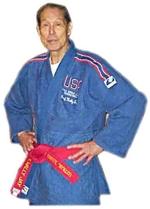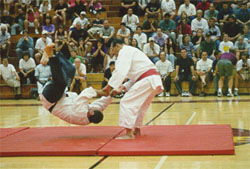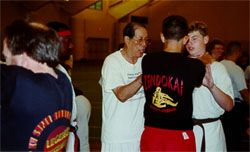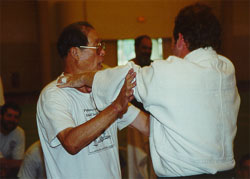|
|||
|
| -Countries |
| -Dictionary |
| -Federations |
| -M.A. Timeline |
| -Number System |
| -Styles |
| -Weapons |
| -Who's Who |
| -Updates |
| -Credits |
| -Stats |
| -Webmaster |
| Professor Wally Jay
Prof Wally, founder and grandmaster of Jujitsu America and Small Circle Jujitsu International, holds a 10th Dan in Jujitsu and 6th Dan in Judo. He has traveled all over the world promoting Kodenkan Jujitsu and Small Circle Jujitsu. Prof. Jay was one of the first of Prof. Henry Okazaki's pupils to advocate cross training. He serves as Technical Director for Jujitsu America. Prof. Wally Jay has an Honorary Doctor of Science Degree from the College of Martial Arts, Sioux Falls, South Dakota, is a graduate of the Nikko Restoration Masseur Institute in Honolulu Hawaii and was listed in Who's Who in Martial Arts in 1977 and 1985. He was named by the Northern California Judo Black Belt Association as "Judo Coach of the Year" in 1960, was Black Belt Hall of Fame's "Man of the Year" in 1960 and their Jujitsu Instructor of the Year in 1969, and was named by Inside Kung Fu magazine as "One of the Most Influential Martial Artists of All Times."
A brief Wally Jay Interview from Black Belt Magazine.com Do you think the international martial arts community is ready for a home called Dragon Temple? Why? I believe so, because Bruce Lee has become so famous in all these years. He has been dead over 20 years and is still very popular. Dragon Temple is fortunate to have his name as part of the project.
There is a variety of styles of martial arts. Do you think Dragon Temple can bring practitioners of these styles together in unity? There is a possibility, but it looks very dim.
Dragon Temple will preserve the history of martial arts. Do you think it is important to know about martial arts history? It is real important, just like genealogy. You can see the
difference in learning. Those days were traditional style in
which you just stick to that style and you don't mix the styles.
Today all of it mixes together. Why? That's the only way you
can learn because you get the best of everything. Protecting
your own system by not letting the other guy know of yours,
this is really wrong. We should all help each other to better
ourselves. I did cross-training many years ago and was hated
for that by my system. Now they say whatever Wally wants he
gets, but I had to prove myself over the years. You have to
cross-train because you can't fight World War II with World
War I weapons.
Dragon Temple's Martial Arts Coliseum will debut a variety of events, such as tournaments, seminars, demonstrations and fighting competitions. Do you think the public will become more aware of the excitement viewing such events at Dragon Temple? I believe it will enhance the knowledge of and excitement of events.
The Brandon Lee Performing Arts Center will have cultural aspects from around the world. Do you think this will enhance the knowledge of environments that martial arts exist in from around the world? People usually are interested in learning of different cultures they don't know about.
Dragon Temple is a non-profit organization and has a goal to help a variety of charities and set up programs for kids. Do you think martial arts is good for kids? Why? Martial arts is really good for kids, because it teaches a lot of discipline and respect. A lot of people don't teach respect today, and that is why we have so many problems. Like when kids are allowed to mouth off to referees at tournaments, it all begins at home and in the martial art school. I would never let my kids do that. Today, it has all gotten out of hand.
Black Belt Magazine's Hall of Fame will be a part of Dragon Temple. Do you think it is important to have a permanent hall of fame for martial arts? Certainly like the Baseball Hall of Fame, everyone should be
the same. There should be one place where each great person
is to be featured.
What has martial arts given to you? I came up the hard way, which was in the traditional times, when people didn't change, but I changed. My peers didn't like me and we didn't get along because I was saying things that made them look bad. But I was trying to tell them that everything improves with time. I overcame a lot of things and fought all the way through and I won. Winning is what was given to me.
|


 He
served as Team Captain of the U.S. Martial Arts Team that traveled
to China in 1985, demonstrated at the First International Wu
Shu Championships in Man, China, and had the honor of demonstrating
at the Dal Nippon Butokukai Festival on Emperor's Day in Kyoto,
Japan. He appeared on CNN when he along with Prof. Tony Maynard
and Erme Boggs, demonstrated in South Africa for the Boputatswana
Government in 1992. Prof. Jay's judo players were one of the
"winningest teams" in the late 1950's and early 1960's,
which led to him being voted as Hokka Judo Yudanshakai Judo
Coach of 1960. In 1960 his team captured the Mexican Judo Championships
in Mexico City, and in 1963-64 the American Jujitsu Institute
awarded him Outstanding Coach of the Year. Since then he's produced
many medallists in national judo championships, such as Bradford
Bunge and David Quinonez, who won national high school titles
in 1968 and 1970 respectively. Prof. Jay has authored two books,
Small Circle Jujitsu and Dynamic Jujitsu, as well as five instructional
videos. His dojo, Island Judo/Jujitsu Club, is located in Alameda,
California.
He
served as Team Captain of the U.S. Martial Arts Team that traveled
to China in 1985, demonstrated at the First International Wu
Shu Championships in Man, China, and had the honor of demonstrating
at the Dal Nippon Butokukai Festival on Emperor's Day in Kyoto,
Japan. He appeared on CNN when he along with Prof. Tony Maynard
and Erme Boggs, demonstrated in South Africa for the Boputatswana
Government in 1992. Prof. Jay's judo players were one of the
"winningest teams" in the late 1950's and early 1960's,
which led to him being voted as Hokka Judo Yudanshakai Judo
Coach of 1960. In 1960 his team captured the Mexican Judo Championships
in Mexico City, and in 1963-64 the American Jujitsu Institute
awarded him Outstanding Coach of the Year. Since then he's produced
many medallists in national judo championships, such as Bradford
Bunge and David Quinonez, who won national high school titles
in 1968 and 1970 respectively. Prof. Jay has authored two books,
Small Circle Jujitsu and Dynamic Jujitsu, as well as five instructional
videos. His dojo, Island Judo/Jujitsu Club, is located in Alameda,
California. 
